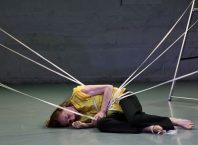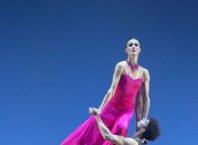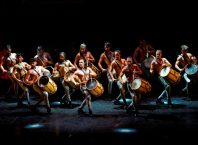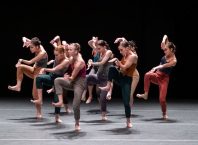Alonzo King LINES Ballet brings rich color to the ballet end of the dance spectrum, with a focus on the formal elements of dance and composition that resists conformity or simple definitions. Driven by the choreographic vision of Alonzo King, the San Francisco based contemporary ballet company will return to Israel to perform at the Israeli Opera from November 13 – 16, 2013, with an additional performance at the Jerusalem Theatre on November 18, 2013.
The evening’s program will be composed of two works choreographed by Alonzo King: Scheherazade and Resin.
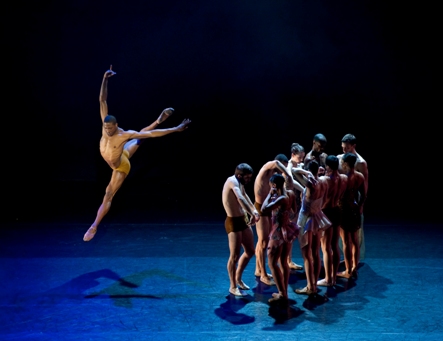
Scheherazade was created as an homage to Sergei Diaghilev and the Ballets Russes, yet it is not a restaging of Mikhail Fokine’s 1910 ballet. King’s fidelity is to the artistic spirit of the Ballets Russes and the creative collaborations fostered there between choreographers, composers, dancers, and artists. Where Fokine choreographed his ballet to Rimsky-Korsakov’s composition, with set and costumes by Leon Bakst, King has worked here with Tabla master Zakir Hussein to reinterpret and rewrite the score, combining traditional Eastern and Western instruments.
King’s ballet is abstract, and does not tell a traditional narrative, choosing instead to convey the atmosphere and associations of Scheherazade’s tale through its form and movement. Yet this in no way diminishes the emotional impact of the work. The long lines of the dancer’s body en pointe, tracing arabesques on the air with her delicate arms, and Scheherazade’s sinuous movement in the hands of her captor are juxtaposed with his grip on her arm; it is, after all, a matter of life and death, or so the story goes.
Scheherazade spun a thousand and one tales to entice the kind to spare her life night after night, and her story, in turn, has come to us in many different versions and languages. King’s Scheherazade is not concerned with the details of a particular narrative but with the struggle itself, the tension between desire and distrust, the power of art and the imagination. Just as the dance is not dominated by narrative, it also enters a complex relationship with the music. The dance does not illustrate the music, nor does one dominate the other, rather, they exist together, as an experience in place and time.
Resin is an organic substance secreted by certain plants, such as conifers, that has had many uses in human culture, from ancient times to the present. In the form of rosin, musicians apply it to the bows of string instruments to increase friction and thereby enhance the sound, dancers rub their shoes in resin to improve their grip on a slippery floor. When trees are slashed to release their resin, the substance that leaks out of the wound hardens, the golden drops are called tears.
Bathed in golden light and symbolic associations, Resin is informed by history and music, with an intriguing score of Sephardic Jewish music that combines archival field recordings with pieces performed by Catalan musician Jordi Savall. The relationship is not one of documentation or an attempt to recreate or quote folk dances. The dialogue between the movement and the music is entirely contemporary, with choreography that is very much of its own time, place and culture, yet taking in and responding to the sounds and rhythms of another culture.
Resin is suffused in beauty. In Resin, King creates the possibility to open up and relate to something that is ours and yet not ours, to experience the way in which the music of one culture may resonate within another, generating new and ever-widening circles of feelings and associations. Whether from our own or another culture, the music, the dance, the images, belong to all of us, and we, in turn, belong to all of history, art, music and dance.
Performances:
Tel Aviv Performing Arts Center (TAPAC): November 13th at 20:00; November 14th at 20:00; November 15th at 13:00; November 16th at 21:00. Tickets may be purchased online or via the Israeli Opera box office, call: 03-6927777.
Jerusalem Theatre: November 18th at 20:30. Tickets may be purchased via the theatre box office, call 02-5605755, or purchase tickets via Bimot, online or call 02-6237000.

